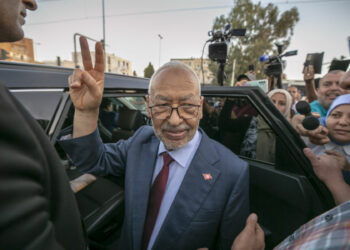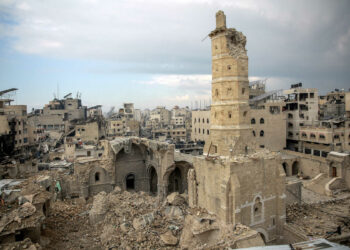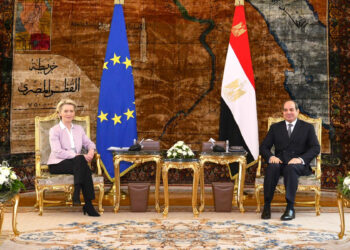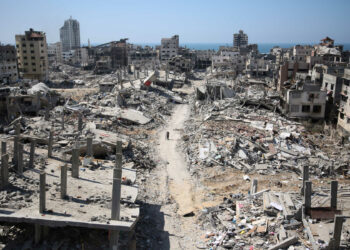Hammadi Khlifi is a Tunisian human rights advocate and novelist based in New York.
عربی
Whenever I coincidentally meet an Arab in New York in a restaurant where we search for the smell of our homes, or whenever I have a meeting to talk about the conditions of our countries or plan a project for our scattered community in the vast United States, the first question I am asked, as if it were an act of accountability or mild reproach from a dear friend: "You are from Tunisia? Lucky you! Your country is a democracy."
Again, I find myself confused in the answer, position and feeling. Are we really the only free country in the MENA region? Have we succeeded in building a cohesive democracy over 10 years, as everyone envies us and congratulates us for? Unfortunately, the facts and figures say quite different things.
What is happening on the Tunisian street, on the ground, apart from the articles celebrating the Tunisian experience?
The reality is very different from what you see in the rankings of freedom of the press and freedom of expression by international organizations such as Freedom House or Transparency International. I think it has become the duty of an objective writer to explain this to the rest of the peoples of the region and the world.
At the beginning of 2021, which is 10 years after the revolution of freedom and dignity, the Tunisian authorities arrested, within one week, more than 2,000 demonstrators with no respect to legal procedures. It is a frightening figure which reflects the big steps backward that the current Tunisian authorities have taken by suppressing peaceful demonstrators demanding development, social and economic justice, and holding the corrupt accountable.
On another level, many detainees have been subjected to severe torture. The security authorities in the city of Monastir, south of the capital, tortured a young man from the social movement, which resulted in the loss of one of his testicles. The young man reported that he was being burnt with cigarettes by police officers in sensitive parts of his body. The young man was arrested on January 27th, 2021 during the massive demonstrations that pervaded all parts of the country. His torture led to the amputation of one of his organs in the country of "democracy and the successful model of the Arab Spring."
Western media, especially in the European Union and the United States, also succeeded in marketing the image of the "Jasmine Revolution" in Tunisia, the peaceful and beautiful revolution that brought nothing but democracy amid the ruin in the rest of the countries where there were revolution attempts. The peoples of other Arab countries considered Tunisia as the hope and the example of the success of the Arab Spring.
Tunisia is still stumbling in the dreadful corruption rampant in its security, judicial, and military institutions, especially in the legislative and executive branches. The parliament speaker is surrounded by suspicions of corruption and weapon and human trafficking deals. Members of parliament are drowned in conflicts of interest, favoritism, and bribery. Also, the judiciary has been issuing prison sentences against dozens of bloggers and writers annually, and confiscating books and newspapers (for example, shutting down Al-Thawra Newspaper by a judicial decision in 2017, and many other incidents. One can just read the numerous Amnesty International or Human Rights Watch reports in this regard).
I really feel ashamed when my friends from the Arab Gulf or the MENA region in general tell me that Tunisians live in the bliss of democracy in Tunisia. How do I reply to them? Do they know the number of torture cases registered in the courts of justice that are buried every day? Do they have an idea of the extent of the repression that writers and artists are subjected to in Tunisia for a mere post, article, or even artwork? The homes of some of those were burnt, and some were threatened with death while others left the country. Do our Arab brothers, with whom we share geography and history, understand the extent of the promoted fallacy? Do they know the extent of the fragility of the institutions that we hoped to be constitutional guardians of the nascent democracy? Do they know how these institutions themselves have turned into nests of corruption, oppression, extortion, and exchanging people's freedom for their silence? Do these friends know when they say that "the answer is Tunisia" that we are a country in which three owners of media outlets are imprisoned, and a fourth fled the country? Do they know that newspapers are being confiscated, and activists and sexual and religious minorities are prosecuted every day? There are even people killed as a result of torture to this day, and money smuggled from the public treasury. People are arrested on suspicion or banned from travel on suspicion. Do my friends believe what I say?
I feel that we, Tunisians, are in the most difficult situation. We are not in a state of war to escape from our country, nor are we in a state of peace and development to live in it. We are neither free nor refugees, nor are we enslaved. We live just in the middle. We are between things.
Many lie to us, intentionally or unintentionally, when they say we live in a beautiful emerging democracy. It is a democracy sick with corruption and an economic crisis that has hit citizens badly. We do not know what to do. Should we stay or leave? Do we struggle or retreat? The battle is still very long for a true democracy in Tunisia, which is what we must all remember after being overwhelmed by the jasmine revolution that left us numb.
Many of us chose exile, including myself. Perhaps this confession may be a little weird. But voluntary exile is much more difficult than forced exile. At least, forced exile is your only option, while voluntary exile is a personal decision. This means you bear the consequences of your decision and of thinking about it. Sometimes you may regret it and feel confused between the hell of exile and alienation, and the hell of the homeland and its destruction, misery, and intense sadness.
We choose to leave, but we are afraid to return. We remain completely stuck in the middle, carrying our bags, our country, and our thoughts on our backs, our souls, and our hearts, looking for a port that can accommodate us. Our situation is expressed by the renowned poet Mahmoud Darwish when he said:
I'm from there
I'm from here
But I'm not there
I am not here
I have two names
They meet and separate
And I have two languages
I forgot in which I used to dream
Photo credit: People stage a protest against the killing of a young Tunisian who was shot in his car, in Dehiba, Tunisia, near the Libyan border, July 12, 2020. (Photo by Yassine Gaidi/Anadolu Agency via Getty Images)







